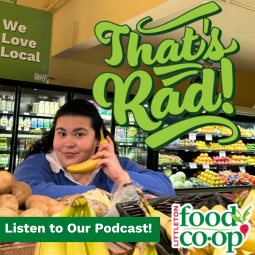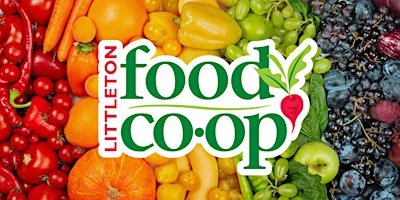October is Fair Trade Month at the Littleton Food Co-op and around the world. Here at the store, we are encouraging all shoppers to consider making a fair trade purchase this month. Many of your long-time favorite brands, such as Annie’s, Kashi, HiBall Energy, Larabar, Honest Tea, Taza Chocolate, and more have fair trade certified products. Other brands, like Equal Exchange and Tony’s Chocolonely, were started with the ideas behind fair trade firmly woven into their business plan. Even some well known national brands have started making progress towards joining the fair trade movement. Producer support is very important, but an equally important ingredient in the success of fair trade is you, the consumers.
Fair Trade is the idea that all members involved in a food system are treated equitably. A company can put a fair trade symbol on their product(s) after being certified by one of many independent trade organizations. There are two popular requirements that third party verifiers require.
The first is that all producers are paid a fair price for their contributions. This is especially prevalent in the coffee industry, where the price of coffee has been steadily declining for years, meaning farmers have a low and unpredictable income. In fair trade situations, farmers are paid a fair trade premium for their products, which creates a guaranteed income and frees up money for things like electricity, running water and education.
The other requirement is not using slave labor or child labor. Slave labor and child is a major issue in the chocolate industry with the harvesting of cacao. In order for farmers to meet the extremely high cacao demands, and for families to earn extra income, children are often forced to do the dangerous harvest work. Children and adults can also be tied to hard labor because of debt, creating situations referred to as modern day slavery.
Along with a number of other requirements, organizations who want to be certified fair trade must pay a fair trade premium and not use child labor or slave labor. These inhumane conditions have been around since these industries began. The large-scale fair trade movement picked-up at the turn of the century, but has still not become “the norm.”
However, what has come from the fair trade movement so far is more consumer awareness of foods’ value chains and the emergence of new companies who have started making advancements in ending such poor conditions. We still have a long way to go to complete fair trade, though. Third-party certificates have too many loopholes and transparency won’t solve such complex issues as modern slavery, but raising awareness of the issue is the first step in improving our global food systems.
As shoppers at the Littleton Food Co-op, you have the power to show your support through your spending. We hope you take advantage of your power this October in honor of Fair Trade Month, and continue to shop with a purpose through the rest of the year.





